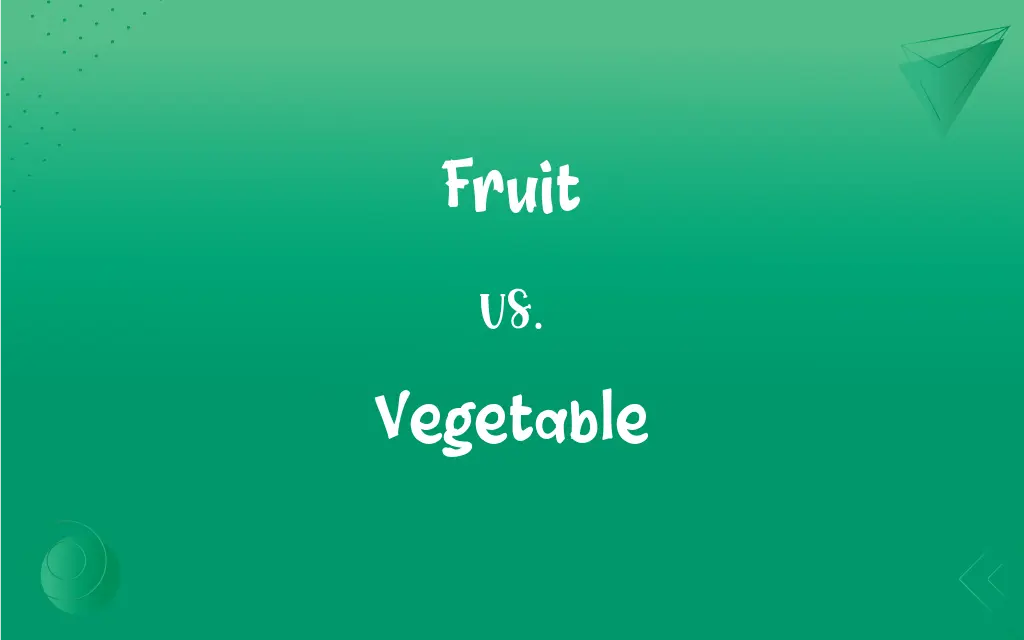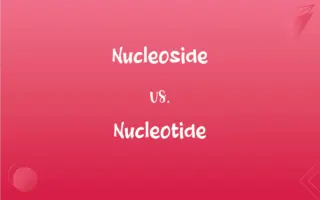Fruit vs. Vegetable: What's the Difference?
Edited by Janet White || By Harlon Moss || Updated on October 11, 2023
Fruits typically contain seeds and develop from the flowers of plants, often sweet or sour in taste; vegetables are edible plant parts, like roots, stems, and leaves, usually more savory or bitter.

Key Differences
Fruits generally emerge from the flowering part of a plant and contain seeds, presenting a vast spectrum of flavors, colors, and textures. Vegetables, in contrast, might come from other non-flowering parts, such as roots, stems, or leaves. Fruits like apples, berries, and oranges are often consumed in a raw state, celebrated for their sweet or tangy flavors. Conversely, vegetables like carrots, spinach, and potatoes are typically cooked or used in culinary contexts for their more savory profiles.
While fruits predominantly offer sweetness and are utilized in various desserts and beverages, vegetables often lean towards the savory and are fundamental in savory dishes. Think of classic desserts like apple pie or beverages like smoothies, which make extensive use of fruits. Vegetables, like bell peppers, onions, and mushrooms, find their way into sautés, stews, and other savory culinary applications, contributing to heartier dishes.
In terms of nutritional content, fruits are usually significant sources of natural sugars, vitamins, and antioxidants. Vegetables generally provide a wider variety of nutrients, like fiber, vitamins, and minerals, sometimes with lower calorie content. Fruits, such as blueberries, are hailed for their antioxidant properties, whereas vegetables, such as broccoli, are often recognized for their dietary fiber and vitamin K levels.
In botanical terms, some plants defy culinary classifications: tomatoes and bell peppers are scientifically fruits since they develop from flowers and contain seeds. In a culinary sense, they're often treated as vegetables due to their savory applications in cooking, which confounds the straightforward categorization of fruits and vegetables. The nuances between these classifications highlight how one plant product can be identified differently in scientific and culinary contexts.
Culturally and culinary, the lines between fruit and vegetable blur, with the former often associated with sweet and sour relishes and desserts, and the latter with savory dishes and sides. The distinction varies globally, with certain fruits being utilized more like vegetables in specific cuisines. For instance, while western cuisines use bananas commonly as a fruit, certain Asian cuisines deploy them as vegetables, incorporating them into savory dishes.
ADVERTISEMENT
Comparison Chart
Origin/Part of Plant
Develops from the flower and contains seeds
Edible parts like stems, roots, leaves, etc.
Typical Taste
Usually sweet or sour
Generally savory or bitter
Culinary Use
Commonly used in desserts, drinks, or eaten raw
Often used in savory dishes, cooked or raw
Nutritional Profile
High in natural sugars and vitamins
Varied nutrients including vitamins and fiber
Examples
Apples, Grapes, Oranges
Carrots, Spinach, Potatoes
ADVERTISEMENT
Fruit and Vegetable Definitions
Fruit
Fruits are often used metaphorically to refer to results or outcomes.
His years of hard work bore fruit when his business prospered.
Vegetable
In a broader sense, "vegetable" can refer to any plant life or plant product.
The scientist experimented with several vegetables to explore botanical properties.
Fruit
In technology, “fruit” can refer colloquially to products produced by Apple Inc.
He bought the latest fruit phone the day it was released.
Vegetable
The term "vegetable" is also used in a culinary context, referring to savory or less sweet plant foods.
She stir-fried the vegetable with garlic and soy sauce for dinner.
Fruit
In culinary contexts, fruit usually refers to a sweet-tasting, seed-containing plant part.
She sliced the fruit to add it to the salad.
Vegetable
"Vegetable" may describe a dull or inactive person in informal, outdated, and potentially offensive slang.
He slouched on the couch like a vegetable all weekend, watching TV.
Fruit
In some contexts, fruit may denote a category in certain games or slot machines.
He aligned three cherries on the fruit machine and won the jackpot.
Vegetable
A vegetable is an edible plant part, such as roots, leaves, or stems.
The chef added a variety of colorful vegetables to the stew.
Fruit
Fruit is a mature ovary of a flowering plant, typically containing seeds.
The apple is a fruit that is often used to make pies.
Vegetable
In medical contexts, "vegetable" may improperly refer to a person who is in a vegetative state (Note: this use is considered insensitive and medically outdated).
The patient remained a vegetable for years after the accident.
Fruit
The ripened ovary or ovaries of a seed-bearing plant, together with accessory parts, containing the seeds and occurring in a wide variety of forms.
Vegetable
A plant cultivated for its edible parts, such as the roots of the beet, the leaves of spinach, the flower buds of broccoli, or the fruit or seeds of certain species, as beans, corn, and squash.
FAQs
Why are apples considered fruits?
Apples develop from the flower of the apple tree and contain seeds, classifying them as fruits botanically.
Can a fruit be classified as a vegetable?
Yes, some botanical fruits, like tomatoes or peppers, are culinarily treated as vegetables due to their savory flavor.
Why are carrots considered vegetables?
Carrots are considered vegetables because they are an edible part of the plant, specifically the root.
Are mushrooms fruits or vegetables?
Neither, mushrooms are fungi and not classified as fruits or vegetables botanically or culinarily.
What distinguishes a fruit from a vegetable botanically?
Botanically, fruits develop from flowers and contain seeds, whereas vegetables can be any other edible part of the plant.
Is it possible for a vegetable to be sweet?
Yes, some vegetables like sweet potatoes or beets can have a sweet taste.
Are tomatoes fruits?
Yes, tomatoes are botanically fruits but are often treated as vegetables in a culinary context due to their savory flavor.
Can vegetables be used in sweet dishes?
Yes, some vegetables like carrots and zucchini are used in sweet dishes like carrot cake and zucchini bread.
Are there vegetables that are typically eaten raw?
Yes, some vegetables like lettuce, cucumbers, and carrots are often eaten raw.
What makes something a citrus fruit?
Citrus fruits, like oranges and lemons, belong to the genus Citrus and are known for their juicy, tangy flavor.
Why are bell peppers fruits and not vegetables?
Botanically, bell peppers develop from flowers and contain seeds, making them fruits, despite their savory flavor.
Which part of the plant do vegetables come from?
Vegetables can come from various plant parts, including roots (carrots), leaves (spinach), stems (celery), and more.
Are fruits always edible?
No, not all fruits are edible, as some can be poisonous or inedible due to hardness, like the fruit of the oak tree, an acorn.
Which is typically higher in sugar, fruits or vegetables?
Fruits are generally higher in sugar compared to vegetables.
Is cucumber a fruit?
Yes, botanically cucumbers are fruits as they develop from the flower of the cucumber plant and contain seeds.
What is a common way to consume vegetables?
Vegetables are commonly consumed cooked or raw in various dishes, salads, or as side items.
How are fruits used in desserts?
Fruits, fresh, dried, or cooked, are often used in desserts due to their natural sweetness, in pies, tarts, and more.
How do you distinguish between a culinary fruit and a culinary vegetable?
Culinary fruits are typically sweet and used in desserts, while culinary vegetables are more savory and used in non-sweet dishes.
Why is an eggplant considered a fruit?
Botanically, since eggplant develops from a flower and contains seeds, it is classified as a fruit.
Can fruits and vegetables grow in the same conditions?
It varies as different fruits and vegetables have distinct growing conditions and climate requirements.
About Author
Written by
Harlon MossHarlon is a seasoned quality moderator and accomplished content writer for Difference Wiki. An alumnus of the prestigious University of California, he earned his degree in Computer Science. Leveraging his academic background, Harlon brings a meticulous and informed perspective to his work, ensuring content accuracy and excellence.
Edited by
Janet WhiteJanet White has been an esteemed writer and blogger for Difference Wiki. Holding a Master's degree in Science and Medical Journalism from the prestigious Boston University, she has consistently demonstrated her expertise and passion for her field. When she's not immersed in her work, Janet relishes her time exercising, delving into a good book, and cherishing moments with friends and family.































































